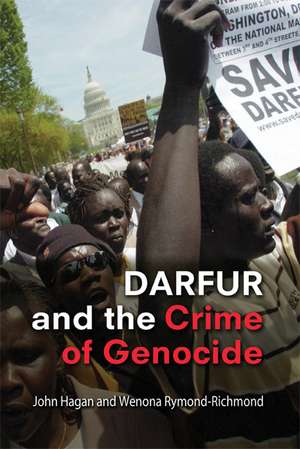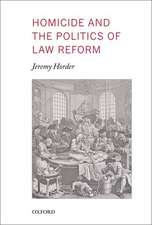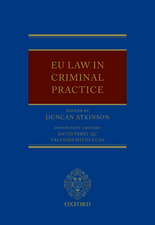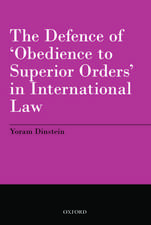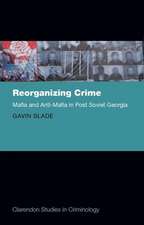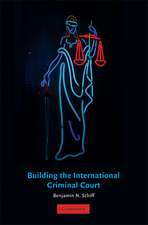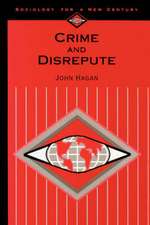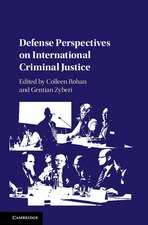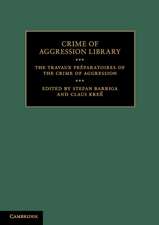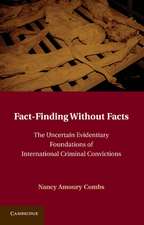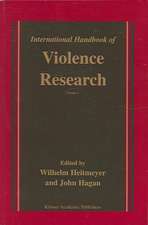Darfur and the Crime of Genocide: Cambridge Studies in Law and Society
Autor John Hagan, Wenona Rymond-Richmonden Limba Engleză Paperback – 12 oct 2008
| Toate formatele și edițiile | Preț | Express |
|---|---|---|
| Paperback (1) | 279.65 lei 6-8 săpt. | |
| Cambridge University Press – 12 oct 2008 | 279.65 lei 6-8 săpt. | |
| Hardback (1) | 484.83 lei 6-8 săpt. | |
| Cambridge University Press – 12 oct 2008 | 484.83 lei 6-8 săpt. |
Din seria Cambridge Studies in Law and Society
-
 Preț: 208.02 lei
Preț: 208.02 lei -
 Preț: 217.08 lei
Preț: 217.08 lei -
 Preț: 169.28 lei
Preț: 169.28 lei - 9%
 Preț: 694.93 lei
Preț: 694.93 lei -
 Preț: 168.85 lei
Preț: 168.85 lei -
 Preț: 233.96 lei
Preț: 233.96 lei -
 Preț: 201.40 lei
Preț: 201.40 lei -
 Preț: 237.42 lei
Preț: 237.42 lei -
 Preț: 236.96 lei
Preț: 236.96 lei -
 Preț: 318.50 lei
Preț: 318.50 lei - 9%
 Preț: 661.48 lei
Preț: 661.48 lei - 11%
 Preț: 559.13 lei
Preț: 559.13 lei -
 Preț: 289.77 lei
Preț: 289.77 lei -
 Preț: 290.78 lei
Preț: 290.78 lei -
 Preț: 274.60 lei
Preț: 274.60 lei -
 Preț: 217.44 lei
Preț: 217.44 lei -
 Preț: 177.28 lei
Preț: 177.28 lei -
 Preț: 163.31 lei
Preț: 163.31 lei -
 Preț: 289.77 lei
Preț: 289.77 lei -
 Preț: 295.08 lei
Preț: 295.08 lei - 14%
 Preț: 723.92 lei
Preț: 723.92 lei -
 Preț: 392.55 lei
Preț: 392.55 lei -
 Preț: 375.68 lei
Preț: 375.68 lei -
 Preț: 379.07 lei
Preț: 379.07 lei - 11%
 Preț: 689.87 lei
Preț: 689.87 lei -
 Preț: 375.68 lei
Preț: 375.68 lei -
 Preț: 327.30 lei
Preț: 327.30 lei - 14%
 Preț: 725.57 lei
Preț: 725.57 lei - 14%
 Preț: 839.50 lei
Preț: 839.50 lei -
 Preț: 429.12 lei
Preț: 429.12 lei - 11%
 Preț: 694.91 lei
Preț: 694.91 lei - 14%
 Preț: 729.73 lei
Preț: 729.73 lei -
 Preț: 373.56 lei
Preț: 373.56 lei -
 Preț: 422.47 lei
Preț: 422.47 lei - 14%
 Preț: 727.72 lei
Preț: 727.72 lei -
 Preț: 308.12 lei
Preț: 308.12 lei -
 Preț: 398.54 lei
Preț: 398.54 lei -
 Preț: 323.95 lei
Preț: 323.95 lei - 14%
 Preț: 726.42 lei
Preț: 726.42 lei - 14%
 Preț: 781.19 lei
Preț: 781.19 lei - 11%
 Preț: 461.43 lei
Preț: 461.43 lei - 11%
 Preț: 530.10 lei
Preț: 530.10 lei
Preț: 279.65 lei
Nou
Puncte Express: 419
Preț estimativ în valută:
53.53€ • 58.16$ • 44.99£
53.53€ • 58.16$ • 44.99£
Carte tipărită la comandă
Livrare economică 21 aprilie-05 mai
Preluare comenzi: 021 569.72.76
Specificații
ISBN-13: 9780521731355
ISBN-10: 0521731356
Pagini: 296
Ilustrații: 2 maps 7 tables
Dimensiuni: 152 x 229 x 16 mm
Greutate: 0.41 kg
Ediția:1
Editura: Cambridge University Press
Colecția Cambridge University Press
Seria Cambridge Studies in Law and Society
Locul publicării:New York, United States
ISBN-10: 0521731356
Pagini: 296
Ilustrații: 2 maps 7 tables
Dimensiuni: 152 x 229 x 16 mm
Greutate: 0.41 kg
Ediția:1
Editura: Cambridge University Press
Colecția Cambridge University Press
Seria Cambridge Studies in Law and Society
Locul publicării:New York, United States
Cuprins
Prologue: on our watch; 1. Darfur crime scenes; 2. The crime of crimes; 3. While criminology slept; 4. Flipflopping Darfur; 5. Eye-witnessing genocide; 6. The rolling genocide; 7. The racial spark; 8. Global shadows; Epilogue: collective R2P.
Recenzii
'To read these pages is to hear the voices of survivors who painstakingly recount the killings, rapes and harrowing devastation in Darfur. The authors use eyewitness reports from more than a thousand State Department interviews to document and analyze the on-going atrocities and the reasons so shamefully little has been done to address this terrible episode in human destruction. In the face of genocide, the ultimate crime, this powerful and insightful book offers valuable lessons - lessons I hope we will learn from - not only for the victims of the Darfur genocide, but for the victims of future genocides, and for our own essential selves.' Mia Farrow, UNICEF and Dream for Darfur
'Why has the field of criminology ignored genocide for so long? The answer to this question has important implications for theories of crime and international policy alike. The terrible tragedy in Darfur serves as the motivation for Hagan and Rymond-Richmond to trace the intellectual history of competing approaches to genocide, from the pioneering work of Sheldon Glueck on Nazi war crimes to controversies over official reaction to atrocities in the former Yugoslavia and now Africa. A call to action, Darfur and the Crime of Genocide is disturbing but necessary reading for all those concerned with international justice and a more general criminological conception of collective responses to crime around the world.' Robert J. Sampson, Harvard University
'This is a remarkable book and an urgently important one. Bringing together a close review of the empirical evidence and a creative use of criminological concepts, the authors assemble a compelling argument that the events in Darfur amount to an intentional, racialized, state-supported, act of genocide. In doing so, The Crime of Genocide presents a criminological case for the prosecution that will be hard to ignore. But that's not all. Hagan and Rymond-Richmond also argue that the discipline of criminology must begin to address crimes of genocide and crimes against humanity - the collective crimes that increasingly define our time but do not yet shape our research. Sixty years ago, Edwin Sutherland transformed criminology with his argument for the inclusion of 'white collar crimes.' The ambition of this book is to expand the criminological imagination once more and to demonstrate what such an undertaking would look like. The Crime of Genocide succeeds on all these counts. It makes a powerful case that the mass killings, rapes and expropriations taking place in Darfur have the actus reus and mens rea of genocidal crimes. It demonstrates that criminology can explain the social mechanisms that drove these collective events. It contributes to public awareness of these crimes and their causes. And it provides crucially relevant evidence for the political and legal processes designed to allocate responsibility, restore peace and prevent the recurrence of such atrocious criminal activities.' David Garland, New York University and author of The Culture of Control
'Documents the genocidal and racial nature of the violence in Darfur and argues for involving the discipline of criminology in prosecutions of genocide …' Chronicle of Higher Education
'… a major scholarly attempt to understand both the ongoing violence in the western region of the African nation of Sudan as well as the international response to that violence. … In Darfur and the Crime of Genocide, Hagan and Rymond-Richmond bring this work as well as unpublished research together in a full-length book. … Darfur and the Crime of Genocide is at once a documentation of atrocities against civilians in Darfur, a recounting of the United States government's response to the atrocities, a sociological analysis of the dynamics of genocide both generally and in Darfur, a critical historical analysis of the academic discipline of criminology, and a call for greater involvement of criminologists in the prosecution of genocide. … the evidence presented in the book, and the techniques used to amass and analyze it, provide a starting point for legal actors and criminologists to work together in recognizing genocide as it occurs, clearing the way for timely intervention and prosecution in the interest of international justice. … Hagan and Rymond-Richmond's identification of a specific racial intent behind a large proportion of the attacks against villagers is a crucial piece of information in understanding the nature of the violence in Darfur.' Katharine W. Hannaford, Researching Law: An ABF Update
'… contributes to public awareness of the crimes being committed in the Darfur region of Sudan by bringing to attention the forgotten or overlooked voices of survivors …' International Criminal Law Review
'Why has the field of criminology ignored genocide for so long? The answer to this question has important implications for theories of crime and international policy alike. The terrible tragedy in Darfur serves as the motivation for Hagan and Rymond-Richmond to trace the intellectual history of competing approaches to genocide, from the pioneering work of Sheldon Glueck on Nazi war crimes to controversies over official reaction to atrocities in the former Yugoslavia and now Africa. A call to action, Darfur and the Crime of Genocide is disturbing but necessary reading for all those concerned with international justice and a more general criminological conception of collective responses to crime around the world.' Robert J. Sampson, Harvard University
'This is a remarkable book and an urgently important one. Bringing together a close review of the empirical evidence and a creative use of criminological concepts, the authors assemble a compelling argument that the events in Darfur amount to an intentional, racialized, state-supported, act of genocide. In doing so, The Crime of Genocide presents a criminological case for the prosecution that will be hard to ignore. But that's not all. Hagan and Rymond-Richmond also argue that the discipline of criminology must begin to address crimes of genocide and crimes against humanity - the collective crimes that increasingly define our time but do not yet shape our research. Sixty years ago, Edwin Sutherland transformed criminology with his argument for the inclusion of 'white collar crimes.' The ambition of this book is to expand the criminological imagination once more and to demonstrate what such an undertaking would look like. The Crime of Genocide succeeds on all these counts. It makes a powerful case that the mass killings, rapes and expropriations taking place in Darfur have the actus reus and mens rea of genocidal crimes. It demonstrates that criminology can explain the social mechanisms that drove these collective events. It contributes to public awareness of these crimes and their causes. And it provides crucially relevant evidence for the political and legal processes designed to allocate responsibility, restore peace and prevent the recurrence of such atrocious criminal activities.' David Garland, New York University and author of The Culture of Control
'Documents the genocidal and racial nature of the violence in Darfur and argues for involving the discipline of criminology in prosecutions of genocide …' Chronicle of Higher Education
'… a major scholarly attempt to understand both the ongoing violence in the western region of the African nation of Sudan as well as the international response to that violence. … In Darfur and the Crime of Genocide, Hagan and Rymond-Richmond bring this work as well as unpublished research together in a full-length book. … Darfur and the Crime of Genocide is at once a documentation of atrocities against civilians in Darfur, a recounting of the United States government's response to the atrocities, a sociological analysis of the dynamics of genocide both generally and in Darfur, a critical historical analysis of the academic discipline of criminology, and a call for greater involvement of criminologists in the prosecution of genocide. … the evidence presented in the book, and the techniques used to amass and analyze it, provide a starting point for legal actors and criminologists to work together in recognizing genocide as it occurs, clearing the way for timely intervention and prosecution in the interest of international justice. … Hagan and Rymond-Richmond's identification of a specific racial intent behind a large proportion of the attacks against villagers is a crucial piece of information in understanding the nature of the violence in Darfur.' Katharine W. Hannaford, Researching Law: An ABF Update
'… contributes to public awareness of the crimes being committed in the Darfur region of Sudan by bringing to attention the forgotten or overlooked voices of survivors …' International Criminal Law Review
Descriere
This book explores firsthand accounts of the genocide in Darfur.
